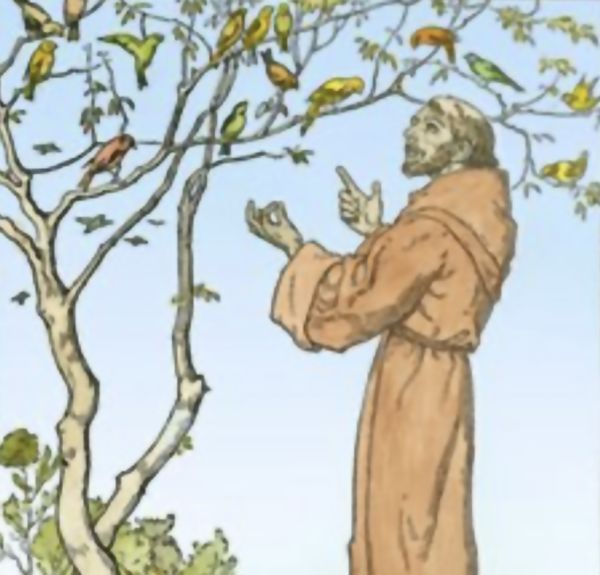In today's Gospel, Jesus rebukes the cities that, despite having received wonderful benefits, had not converted. It echoes:
«Woe to you, Chorazin! Woe to you, Bethsaida!» (Lk 10:13).
The present Judgement looms on the horizon.
Jesus emphasises their failure to listen and their contempt for his messengers: it is as if they were doing all this directly to him.
Francis of Assisi was deeply grateful to God for having drawn him from the courteous and distracted life of the world to the service of the Gospel.
But like every authentic prophet, Francis also encountered the contempt of men on his journey of faith.
However, as a true disciple of Christ who loves to conform to the Lord even in this, he did not cease to proclaim conversion and penance to all, spreading the Word of God everywhere and even preaching to the birds:
"It is said that Francis, travelling with his companions through towns and villages, came to a town to preach the Word of God. But as soon as he began his speech, the citizens of the place, observing him in that strange manner of dress, drove him out of the town as a madman.
Then Francis, going out into the countryside and standing on the public road, observed in a field a large number of birds of different species, intent on pecking.
He turned to them and called them to come to him, as if he were speaking to men; and immediately, at his call, such a multitude of birds of every kind gathered around him that it was said that never had so many been seen in those parts" (FF 2307).
Those who listen to the prophets of God listen to God himself, and those who do not listen to them reject God himself.
But Francis did not stop at the contempt of men, because he knew that the disciple is not greater than his Master, and he taught this to his friars.
In fact, the Sources still attest to this.
Francis maintained that if, after the convocation of the chapter assembly, he were called to preach the Word of God and immediately afterwards rejected, he should still be content.
'I rise and preach according to the inspiration of the Holy Spirit. I finish the sermon.
Let us suppose that then, after thinking about it, they conclude by saying to me:
'We do not want you to reign over us, because you cannot speak, you are too simple, we are ashamed to have such an uneducated and incapable person as our leader. From now on, do not presume to call yourself our prelate!'. And so saying, they drive me away, reviling me.
Well, I could not consider myself a true friar minor if I did not remain equally serene when they revile me and ignominiously drive me away [...] as when they honour me [...] provided that their advantage is the same [...] for here there is certain gain for the soul" (FF 1639).
«Nevertheless, it will be more tolerable for Tyre and Simon in the judgement than for you» (Lk 10:14)
Friday, 26th wk. in Ordinary Time (Lk 10:13-16)












